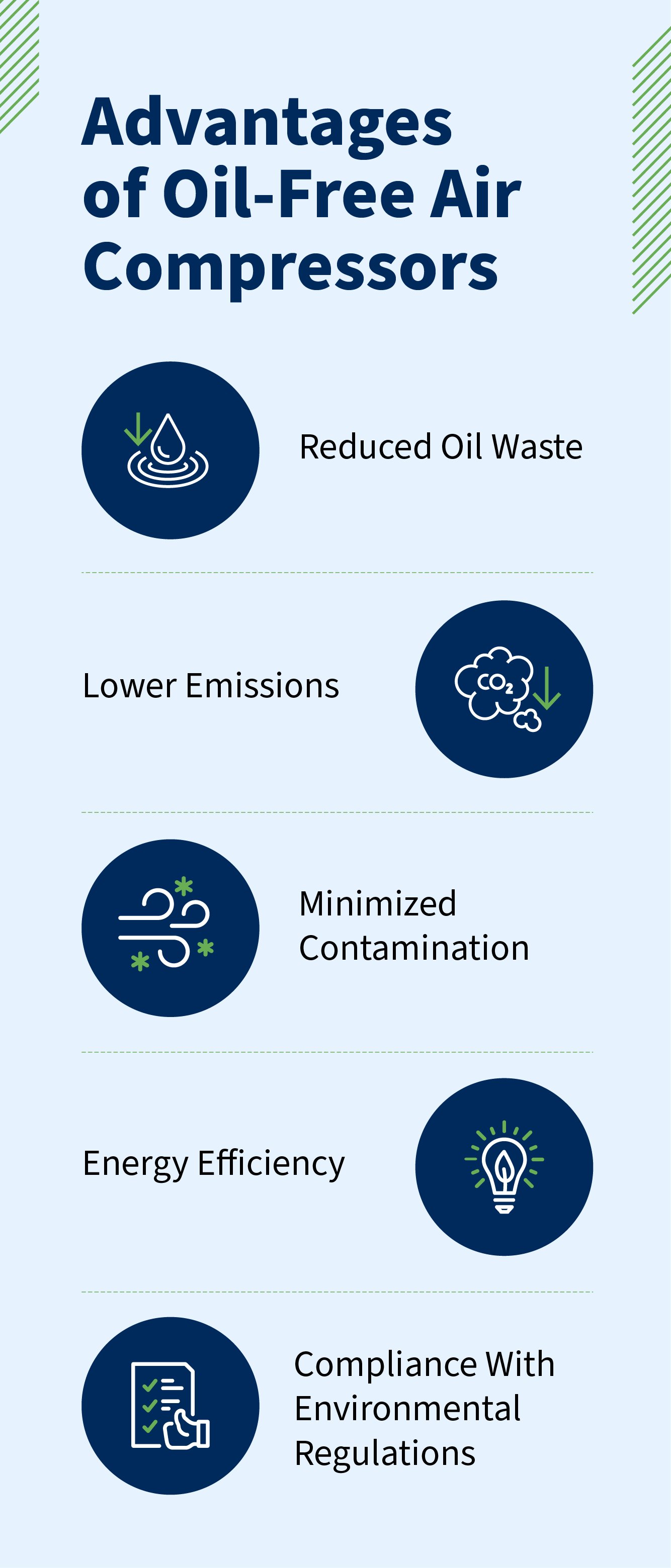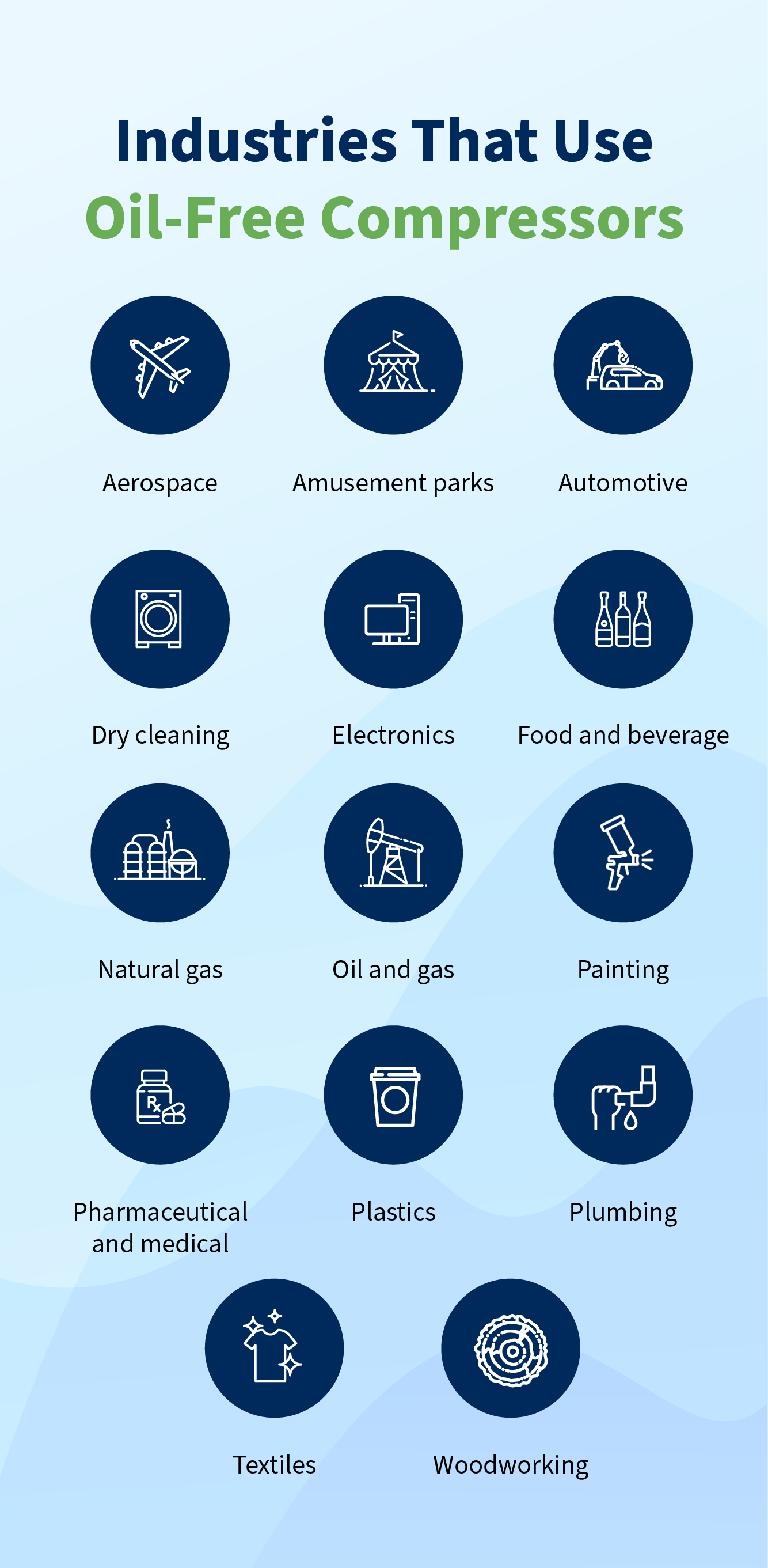Air compressors are machines that take in air from the environment and compress it to a higher pressure. This compressed air can then be used for various purposes, such as powering tools, inflating tires or providing air for industrial processes. Compressed air can store energy and be released when needed for versatile tasks like spray painting or powering pneumatic tools.
In oil-free air compressors, special materials and designs ensure smooth operation without oil. This means they produce cleaner air, which is especially important in industries where air quality is crucial. Quincy Compressor explains the environmental benefits of using oil-free compressors compared to the traditional models.
Contact Us Learn More Find a Dealer Near You
What Is the Difference Between Oil-Free and Oil-Lubricated Air Compressors?
The main difference between oil-free and oil-lubricated air compressors lies in their lubrication methods and the resulting air quality.
The rotary screw compressor was invented in the 1930s and became popular in industrial applications due to its reliability and ability to produce large volumes of compressed air. These compressors have two rotors that revolve in a compression chamber and pressurize air. Oil-lubricated compressors were later introduced to reduce friction and wear on moving parts, which increased their life spans and efficiency.
In response to growing environmental concerns and the need for cleaner air, oil-free compressors were developed in the late 20th century. These compressors use advanced materials and designs to eliminate oil contamination, making them suitable for more sensitive applications.
Oil-free compressors mainly differ from oil-lubricated compressors in the following ways:
- Lubrication: Oil-lubricated air compressors use oil that lubricates moving parts and acts as sealant and coolant. In contrast, oil-free air compressors use no oil in the compression chamber. Instead, they rely on water or other materials like Teflon, which helps prevent contamination.
- Air quality: Oil-free compressors provide cleaner, oil-free air, making them ideal for applications where air purity is necessary, such as in food processing, pharmaceuticals and electronics. Since there’s no risk of oil contamination, products are free from spoilage and equipment from damage. While oil-lubricated air compressors are durable and efficient, they have a risk of oil contamination in the compressed air.
- Maintenance: Oil-lubricated compressors require regular maintenance, including oil changes and filter replacements, to ensure optimal performance. Because there’s no oil to change or filters to clean, oil-free compressors typically need less maintenance.
- Noise levels: Oil-free air compressors tend to operate more quietly than traditional oil-lubricated compressors.
How Does an Oil-Free Compressor Work?
Oil-free compressors are designed to compress air without using oil for lubrication, ensuring the compressed air remains clean and free from contaminants. Instead, they use low-friction coatings to reduce wear and friction in the compression chamber.
Advanced sealing technologies prevent air leakage and maintain high air quality to ensure compliance with stringent standards like ISO 8573 Class 0. These compressors often incorporate air or water cooling systems to manage heat generated during compression.
There are three main types of oil-free compressors:
- Rotary screw compressors: These compressors use counter-rotating screws that don’t come into contact with each other, eliminating friction and the need for lubrication in the compression chamber. They often include intercoolers to manage temperature.
- Piston compressors: Piston compressors feature pistons with Teflon-coated rings that compress air without injecting oil into the chamber. They typically have external cooling fans to manage heat.
- Scroll compressors: Scroll compressors consist of two spiral-shaped rotors that compress air as they move against each other. The design prevents contact between the spirals, eliminating the need for lubrication in the compression chamber.
The steps in the oil-free compression process include:
- Intake of air: An unloader valve draws ambient air into the compressor. The air passes through an inlet air filter designed to remove dust, dirt and other particles. This filtration helps maintain the purity of the compressed air and protects the internal components of the compressor.
- Compression process: The filtered air enters the compression chamber where it’s compressed to the required pressure. The method of compression will vary depending on the type of oil-free compressor.
- Cooling stage: The air is often very hot due to the initial compression process. It passes through an intercooler, which cools the air before it undergoes further compression. This cooling stage prevents overheating and maintains the efficiency of the compressor. The intercooler may also include moisture traps to remove any condensation that forms during cooling to ensure the air remains dry and clean.
- Second compression: In multistage compressors, the cooled air may be sent back into a second compression chamber for additional compression. This step increases the pressure, typically reaching higher levels than the initial stage. After this second compression, the air is cooled again to ensure it’s at a suitable temperature for storage or use.
- Air preparation and delivery: The air flows through an aftercooler to cool it further before it’s stored in a tank or delivered to the end-use application. As the air moves to the storage tank, it passes through check valves that prevent backflow so the compressed air remains in the tank.
- Pressure monitoring: The compressor is equipped with pressure switches that monitor the air pressure in the storage tank. When the pressure drops below a predetermined level, the compressor automatically restarts to rebuild the pressure to ensure a continuous supply of compressed air.
What Is the Advantage of an Oil-Free Air Compressor for the Environment?
Reduced Oil Waste
Since oil-free compressors use no oil for lubrication, there’s no need for oil changes or disposal. This aspect reduces the amount of used oil waste generated during operations and disposal, which is hazardous to the environment.
Eliminating oil from the compression process helps businesses prevent oil spills and leaks that can contaminate soil and water sources. Oil-free compressors contribute to companies’ conservation efforts and enhance their reputation as responsible stewards of the environment.
Lower Emissions
Oil-lubricated compressors emit volatile organic compounds and particulate matter, which are harmful pollutants that can degrade air quality and pose health risks to workers. In contrast, oil-free compressors produce fewer emissions. They don’t burn oil or release harmful smoke or gas into the atmosphere, which contributes to cleaner air quality.
Air quality is essential for product integrity in industrial settings. For example, in applications like painting and spray finishing, even a trace of oil can compromise the quality of the finished product. Using oil-free compressors also enhances workplace safety. Eliminating the risk of oil contamination helps maintain a clean and safe working environment.
Minimized Contamination
The advantage of oil-free air compressors in terms of oil contamination is significant, especially for industries where air purity is critical. The absence of oil particles in the air means there’s no risk of contaminating the products being manufactured, and the final output meets stringent cleanliness standards.
Many industries have strict cleanliness standards that they must adhere to when it comes to the quality of their products. Oil-free compressor technology helps businesses meet these standards. In health care and food processing sectors, even minor contamination can have serious consequences and lead to product spoilage or recalls.
Energy Efficiency
Oil-free compressors are generally more energy-efficient than their oil-lubricated counterparts. They consume less electricity to operate, which translates to lower energy bills for businesses. Other ways oil-free air compressors reduce energy expenses include:
- Reduced carbon emissions: Oil-free compressors contribute to lower carbon emissions by consuming less energy. As companies focus on eco-friendly practices, using these compressors becomes a vital part of their strategy.
- Advanced technology: Many oil-free compressors incorporate modern technologies like variable speed drives. These systems adjust the compressor’s output based on demand, which further enhances energy efficiency.
- Longer life spans: With fewer moving parts and no oil changes required, oil-free compressors typically have lower maintenance needs. Longer life spans also mean fewer replacements over time, reducing the need for new materials and manufacturing processes.
Compliance With Environmental Regulations
Many industries are under increasing pressure to reduce their environmental footprint, and using oil-free compressors aligns with these sustainability goals. Producing clean air, these compressors meet the necessary environmental standards set by various regulatory bodies, reducing the risk of legal and operational issues.
The Energy Policy and Conservation Act is one regulation with strict energy standards for products, equipment and machinery, including air compressors. Switching to newer, oil-free compressors and other sustainable technologies can help companies meet energy standards and demonstrate their commitment to environmental responsibility.
Where Are Oil-Free Compressors Used?
Many sectors benefit from using oil-free compressors in their operations, such as:
- Aerospace: In the aerospace industry, oil-free compressors are essential for applications ranging from launching rockets to controlling contamination. Clean compressed air maintains the integrity of sensitive components and systems, ensuring safety and reliability in aerospace operations.
- Amusement parks: Oil-free compressors are used in amusement parks to power roller coasters and other attractions. They facilitate ride movement, help cars arrive at stops and enhance the immersive experience for guests, all while making sure the air used is clean and free from contaminants.
- Automotive: In the automotive industry, oil-free compressors help create high-quality paint finishes by preventing oil contamination, which can compromise the appearance and adhesion of paint. Additionally, they help maintain robotic equipment and provide a safe working environment by eliminating harmful oil particles.
- Dry cleaning: Oil-free compressors are used for pressing garments and processing solvents. They provide clean compressed air that doesn’t damage or contaminate clothing.
- Electronics: Pure, dry air is necessary for producing sensitive components like printed circuit boards. Oil-free air compressors prevent oil contamination, which can damage intricate electronic parts and disrupt precision processes.
- Food and beverage: The food and beverage industry relies on oil-free compressors for air purity during processing, packaging and bottling.
- Natural gas: In the natural gas industry, oil-free compressors are essential for applications such as gas transfers and vapor recovery. They provide pure air without contaminants, which is crucial for processes like gas separation and maintaining safety standards.
- Oil and gas: Oil-free compressors promote reliability and safety in the oil and gas industry. They prevent oil contamination in processes like instrument air supply and pipeline testing, helping companies comply with safety regulations and reduce maintenance costs.
- Painting: Oil-free compressors are used in painting applications to provide clean air for spray painting. They allow artists and manufacturers to achieve high-quality finishes without the risk of oil contamination affecting the paint.
- Pharmaceutical and medical: In pharmaceutical and medical applications, oil-free compressors are critical for maintaining the highest levels of air purity. They’re used in the production of medicines, sterilization processes and medical air systems to ensure products are free from harmful contaminants.
- Plastics: The plastics industry benefits from oil-free compressors by receiving consistent and clean air for production processes. Their minimal components and maintenance requirements make them reliable choices for plastic manufacturing.
- Plumbing: Plumbing professionals use oil-free compressors to test water pressure in piping systems. The clean air provided by these compressors allows technicians to evaluate water quality without the risk of contamination.
- Textiles: In the textile industry, oil-free compressors help reduce production losses and fabric stains. They maintain compliance with air purity standards, allowing for clean production processes in spinning, weaving and dyeing.
- Woodworking: Woodworking businesses, such as furniture manufacturers, benefit from the cost-effective and dependable nature of oil-free compressors. They provide clean air for various woodworking applications.
Oil-Free Compressors Benefits Your Business and the Environment
Using oil-free compressors supports cleaner air, conserves resources and reduces waste, making them a great choice for industries that are focused on sustainability. As industries increasingly prioritize sustainability, the demand for oil-free air compressors will also keep rising, encouraging manufacturers to innovate and offer more environmentally friendly products.
Oil-free compressors are also more energy-efficient and require less maintenance, which could positively impact your operational costs and efficiency. With these oil-free options, you can create products that are safer and higher quality.




